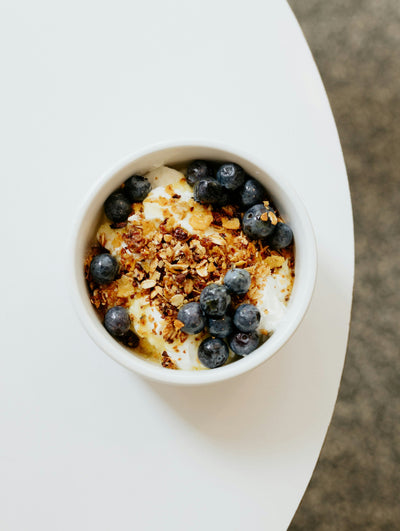Whether you’re suffering from brain fog, struggling to concentrate, looking to boost your mood, or concerned about rising rates of Alzheimer’s and other forms of dementia, brain health is increasingly becoming a top priority for many of us. While living a balanced lifestyle, managing stress and staying physically active are essential in today’s fast-paced world, there are also simple, science-backed strategies we can adopt to support our brain health – both now and in years to come.
Brain Hacks
Time-restricted eating
Time-restricted eating has been linked to a wide range of health benefits, from improved metabolism, sleep and cardiovascular function to more stable blood sugar levels and healthy weight management. Research also suggests it may enhance cognitive function, boost memory and fend off neurodegenerative diseases, such as Alzheimer’s and Parkinson’s.
In one study, mice that ate within a six hour window each day (equivalent to an 18 hour fast), not only showed improved memory, but also had reduced levels of amyloid, a protein linked to the progression of dementia. (1) Our tip? Try narrowing your daily eating window. The 16:8, where you eat within an eight-hour window and fast the rest is a popular and relatively simple place to start.
Breathwork
Deep, slow breathing – specifically the kind that activates the parasympathetic nervous system, which governs our rest and digest state – can support brain health by improving blood flow and increasing oxygen delivery to the brain. Studies have found that slowing down your breathing, especially your exhalations, can significantly boost cognitive function and improve retention of newly learned skills. It’s a powerful, accessible tool that we all have at our fingertips. (2)
To get started, try box breathing: inhale for four, hold for four, exhale for four, then hold again for four, and repeat. You can gradually increase the count as you become more comfortable. Alternatively, a sharp inhale, followed by a long, slow exhale is another effective way to trigger the parasympathetic nervous system.
Incorporate a Nootropic supplement
Nootropics are compounds known to enhance cognitive functions such as learning, memory, focus and mood, while supporting overall brain health. Incorporating a targeted supplement – like our Enhanced Nootropics– into your daily routine can help you feel calmer, more focused and better equipped to handle stress. Formulated with magnesium glycinate, the adaptogen Ashwagandha and Vitamins B6 and B12, it’s an easy addition to your routine, particularly during times of high stress or ailing mood.
Start your day with bright light
From regulating your circadian rhythm (which improves sleep, come night) to boosting mood, alertness and immune function, exposure to bright light first thing in the morning is more important than many realise. Studies show that morning light enhances cognitive performance, supports memory formation, and promotes overall brain health. (3,4)
Aim to get 15 to 30 minutes of natural sunlight as soon as you can after waking. In the dark winter months, consider using a SAD lamp, which mimics 10,000 lux of bright light to maintain these benefits.
Feed your brain the right nutrients
While not technically a hack, consuming plenty of the right nutrients – and forgoing inflammatory refined sugars and ultra-processed foods – is also brilliant for brain health. Omega-3 fatty acids are particularly powerful, improving blood flow to the brain and enhancing memory, says the science. While fatty fish is an excellent source, you can also find it in our Essential Omegas supplement. (5)
B Vitamins and Vitamin D also play crucial roles in supporting mental clarity and preventing cognitive decline, so make sure you’re eating a balanced diet rich in leafy greens, eggs and whole grains, as well as supplementing Vitamin D.
Try contrast therapy
Exposure to the cold – whether that’s care of an ice bath or a minute spent under a cold shower – is brilliant for sharpening focus, reducing stress and improving overall mental wellbeing. Why? Because it increases endorphin and norepinephrin levels, which help the body regulate attention, alertness and mood.
Some research has found that cold water immersion increases the neural connection between different parts of the brain, which may explain the almost immediate lift in mood and clarity people often report after a dunk in the cold. While cold water exposure isn’t always easy, you can glean similar benefits by trying contrast therapy, where you alternate between hot and cold water in the shower, building up the time you spend in the cold as you do. (6)
References
-
Daniel S. Whittaker, Laila Akhmetova, Daniel Carlin, Haylie Romero, David K. Welsh, Christopher S. Colwell, Paula Desplats, Circadian modulation by time-restricted feeding rescues brain pathology and improves memory in mouse models of Alzheimer’s disease,Cell Metabolism, Volume 35, Issue 10, 2023. Pages 1704-1721.e6,https://doi.org/10.1016/j.cmet.2023.07.014 (https://www.sciencedirect.com/science/article/pii/S1550413123002735)
-
Lee SH, Park DS, Song CH. The Effect of Deep and Slow Breathing on Retention and Cognitive Function in the Elderly Population. Healthcare (Basel). 2023 Mar 20;11(6):896. doi: 10.3390/healthcare11060896. PMID: 36981553; PMCID: PMC10047962.
-
Vandewalle G, Balteau E, Phillips C, Degueldre C, Moreau V, Sterpenich V, Albouy G, Darsaud A, Desseilles M, Dang-Vu TT, Peigneux P, Luxen A, Dijk DJ, Maquet P. Daytime light exposure dynamically enhances brain responses. Curr Biol. 2006 Aug 22;16(16):1616-21. doi: 10.1016/j.cub.2006.06.031. PMID: 16920622.
-
Inami, S., Sato, S., Kondo, S., Tanimoto, H., Kitamoto, T., & Sakai, T. (2020). Environmental light is required for maintenance of long-term memory in drosophila. Journal of Neuroscience, 40(7), 1427–1439. https://doi.org/10.1523/JNEUROSCI.1282-19.2019
-
Dighriri IM, Alsubaie AM, Hakami FM, Hamithi DM, Alshekh MM, Khobrani FA, Dalak FE, Hakami AA, Alsueaadi EH, Alsaawi LS, Alshammari SF, Alqahtani AS, Alawi IA, Aljuaid AA, Tawhari MQ. Effects of Omega-3 Polyunsaturated Fatty Acids on Brain Functions: A Systematic Review. Cureus. 2022 Oct 9;14(10):e30091. doi: 10.7759/cureus.30091. PMID: 36381743; PMCID: PMC9641984.
-
Yankouskaya A, Williamson R, Stacey C, Totman JJ, Massey H. Short-Term Head-Out Whole-Body Cold-Water Immersion Facilitates Positive Affect and Increases Interaction between Large-Scale Brain Networks. Biology (Basel). 2023 Jan 29;12(2):211. doi: 10.3390/biology12020211. PMID: 36829490; PMCID: PMC9953392.
Disclaimer: The information presented in this article is for educational purposes only and is not intended to diagnose, prevent, or treat any medical or psychological conditions. The information is not intended as medical advice, nor should it replace the advice from a doctor or qualified healthcare professional. Please do not stop, adjust, or modify your dose of any prescribed medications without the direct supervision of your healthcare practitioner.


















































